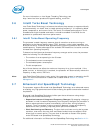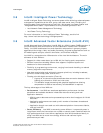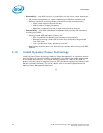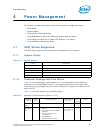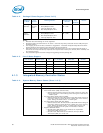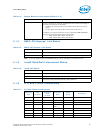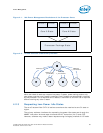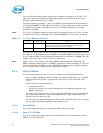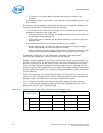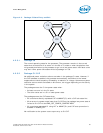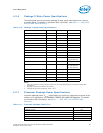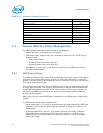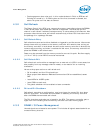
Power Management
90 Intel® Xeon® Processor E5-1600 v2/E5-2600 v2 Product Families
Datasheet Volume One of Two
from the ACPI-defined processor clock control registers, referred to as P_LVLx. This
method of requesting C-states provides legacy support for operating systems that
initiate C-state transitions via I/O reads.
For legacy operating systems, P_LVLx I/O reads are converted within the processor to
the equivalent MWAIT C-state request. Therefore, P_LVLx reads do not directly result in
I/O reads to the system. The feature, known as I/O MWAIT redirection, must be
enabled in the BIOS.
Note: The P_LVLx I/O Monitor address needs to be set up before using the P_LVLx I/O read
interface. Each P-LVLx is mapped to the supported MWAIT(Cx) instruction as follows.
The BIOS can write to the C-state range field of the PMG_IO_CAPTURE MSR to restrict
the range of I/O addresses that are trapped and emulate MWAIT like functionality. Any
P_LVLx reads outside of this range does not cause an I/O redirection to MWAIT(Cx) like
request. They fall through like a normal I/O instruction.
Note: When P_LVLx I/O instructions are used, MWAIT substates cannot be defined. The
MWAIT substate is always zero if I/O MWAIT redirection is used. By default, P_LVLx I/O
redirections enable the MWAIT 'break on EFLAGS.IF’ feature which triggers a wakeup
on an interrupt even if interrupts are masked by EFLAGS.IF.
4.2.4 Core C-states
The following are general rules for all core C-states, unless specified otherwise:
• A core C-State is determined by the lowest numerical thread state (e.g., Thread 0
requests C1E while Thread 1 requests C3, resulting in a core C1E state). See
Table 4-7.
• A core transitions to C0 state when:
— an interrupt occurs.
— there is an access to the monitored address if the state was entered via an
MWAIT instruction.
• For core C1/C1E, and core C3, an interrupt directed toward a single thread wakes
only that thread. However, since both threads are no longer at the same core
C-state, the core resolves to C0.
• An interrupt only wakes the target thread for both C3 and C6 states. Any interrupt
coming into the processor package may wake any core.
4.2.4.1 Core C0 State
The normal operating state of a core where code is being executed.
4.2.4.2 Core C1/C1E State
C1/C1E is a low power state entered when all threads within a core execute a HLT or
MWAIT(C1/C1E) instruction.
Table 4-8. P_LVLx to MWAIT Conversion
P_LVLx MWAIT(Cx) Notes
P_LVL2 MWAIT(C3) The P_LVL2 base address is defined in the PMG_IO_CAPTURE MSR,
described in the Intel® Xeon® Processor E5 v2 Product Family
Processor Datasheet, Volume Two: Registers.
P_LVL3 MWAIT(C6) C6. No sub-states allowed.



